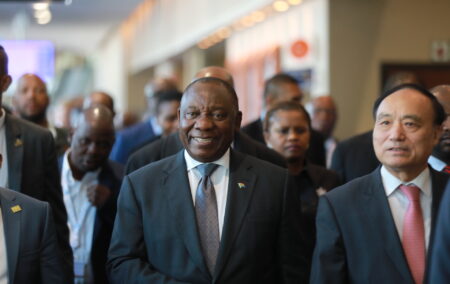Is South Africa under democracy, ruled by the African National Congress (ANC), doomed to slower growth than it had under apartheid?
Is it impossible for South Africa under President Cyril Ramaphosa to match the high economic growth and rapid industrialisation that occurred under Prime Ministers Verwoerd and Vorster?
I asked this question last year during the parliamentary hearings on our dreadful Integrated Resources Plan 2018 (IRP2018), which plans our electricity sources until 2030. The ANC has wrecked Eskom and my main concern was that the IRP’s huge reliance on solar and wind, which have proved staggeringly expensive and hopelessly unreliable all around the world, would simply worsen the electricity disaster. My secondary concern was that the IRP only allowed for a growth in electricity demand of 2% per year. I said that, for South Africa to make a dent on our catastrophic unemployment, we should need economic growth of at least 5% per year. Based on the last 60 years, this would require at least 5% electricity growth. I asked in a sarcastic voice if they really believed that the ANC could never get the economic growth achieved by the apartheid government. My sarcasm was not answered.
Instead, there was a glum silence from the rest of the participants. I realised that the answer to my question was “yes”. I was cast into a puzzled gloom. I didn’t know what more to say. And I have to admit that almost every political and economic commentator also says “yes”. In fact, I can think of no exception, nobody believes that the ANC can ever produce high growth and high industrialisation.
From 1963 to 1971, South Africa had economic growth of over 5% and sometimes over 6%. During that time there was rapid industrialisation and electricity demand grew about twice as much as economic growth. Responding to the growing demand, Eskom built a series of giant, standardised, ‘six-pack’ (six identical units) coal stations, very successfully, and gave us the cheapest electricity in the world, very reliably. This was at a time when South Africa faced huge economic threats, most from within but some from without. The ruinous pass laws and job reservation crippled the economy; Bantu education stunted the skilling of black people (except in theory in the farcical ‘homelands’); the outside world began to condemn apartheid and put sanctions against South Africa. In spite of all of this, the economy grew strongly until about 1980, and more and more people were employed in factories and mills.
Why can’t the ANC do the same now? After 1994, most of our economic threats fell away. The horrible apartheid laws were scrapped; the outside world removed sanctions; South Africa became a darling rather than the pariah; free trade with all nations beckoned; there were no bars on investment. Yet, 25 years later, economic growth is dismal, unemployment is catastrophic, and industry is in full retreat. And I seem to get the feeling, profoundly depressing, even despairing, that almost all commentators, especially those most opposed to apartheid, say, ‘Of course. What did you expect? This was inevitable.’
It was inevitable that the beneficiation of our mineral treasures, which happened to some extent under apartheid, would end under the ANC. It was inevitable that we now should send all of our raw minerals overseas to be processed into high-value products. It was inevitable that our business people, terrified by the violent ANC trade unions, who demand double-inflation pay increases and threaten anybody who breaks their strikes, would take all of their money away from industries using unskilled or semi-skilled labour (mainly black) and put it instead into service industries, into banking and insurance. The apartheid regime regarded Eskom as an institution for making electricity; it was inevitable that the ANC would change it into an employment agency, a magic pot of value to be looted, and an agency of political and racial engineering, of affirmative action, transformation and black economic empowerment.
The inevitable future under the ANC, they suggest, is this: a massive and growing government and civil service with huge salaries; vast SOEs failing calamitously and sucking our treasury dry; mass emigration of skills; a small number of rich people working as bankers and brain surgeons; and a vast and growing army of people working as beggars and prostitutes or surviving somehow on our rapidly expanding social grants, which provide a miserable existence just short of starvation.
For a while we blamed everything on Jacob Zuma. But, now that he has been replaced with a more honest ANC man, we see that the problem is not personal but institutional. The problem is not Zuma; it is the ANC, and it has been since about 1976. The ANC is obviously an improvement on apartheid but not in all ways. When shall we be allowed to point out what the ANC has done wrong and how to correct it without being labelled as racists?
Notes:
- At the parliamentary hearings on IRP2018, I spoke with Leon Louw on his ‘Truth in Energy Campaign’.
- I have a mass of data from 1956 showing Eskom’s electricity demand and SA GDP, and can back up everything I saw, in detail.
- On beneficiation, SA, which has huge chrome deposits, used to make ferrochrome (an ingredient for making stainless steel) under apartheid. It seldom does now. It just shifts out the chromium ore.
Andrew Kenny is a writer, an engineer and a classical liberal.
The views of the writer are not necessarily the views of the IRR.
If you like what you have just read, become a Friend of the IRR if you aren’t already one by SMSing your name to 32823 or clicking here. Each SMS costs R1.’ Terms & Conditions Apply.

